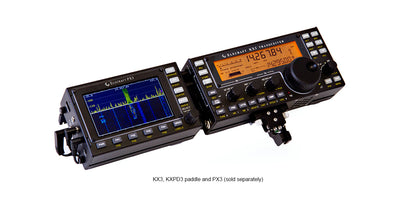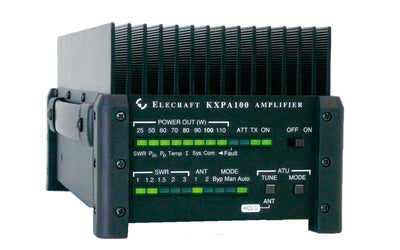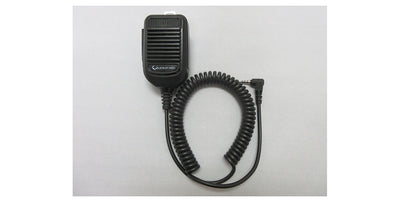KX3 160-6M TRANSCEIVER, FACTORY ASSEMBLED
Ultra-Compact Home/Portable/Mobile Station
The revolutionary Elecraft KX3 puts the world in the palm of your hand! Despite its small size, it covers all amateur bands from 160-6 meters, operates in all modes, and has DSP-based features usually found only on larger radios. Available options and accessories allow the KX3 to be tailored to your needs, including the PX3 panadapter, KXPA100 100 watt amplifier, internal ATU, and internal 2- or 4-meter all-mode transverter.
Whether you're bagging a new peak on a SOTA outing, pounding out QSOs on Field Day, or working rare DX from the comfort of your home station, your KX3 will provide the features and performance you need.
Note: Keyer paddle and microphone may be purchased separately under Options/Accessories.
Build It Yourself Option
You can purchase the KX3 as a kit or factory assembled. All options will be installed at the time you purchase a factory Assembled product. Whether you choose a kit or factory assembled product, you may purchase additional options at any time and install them yourself - just choose any options under the "Kit Options" section.
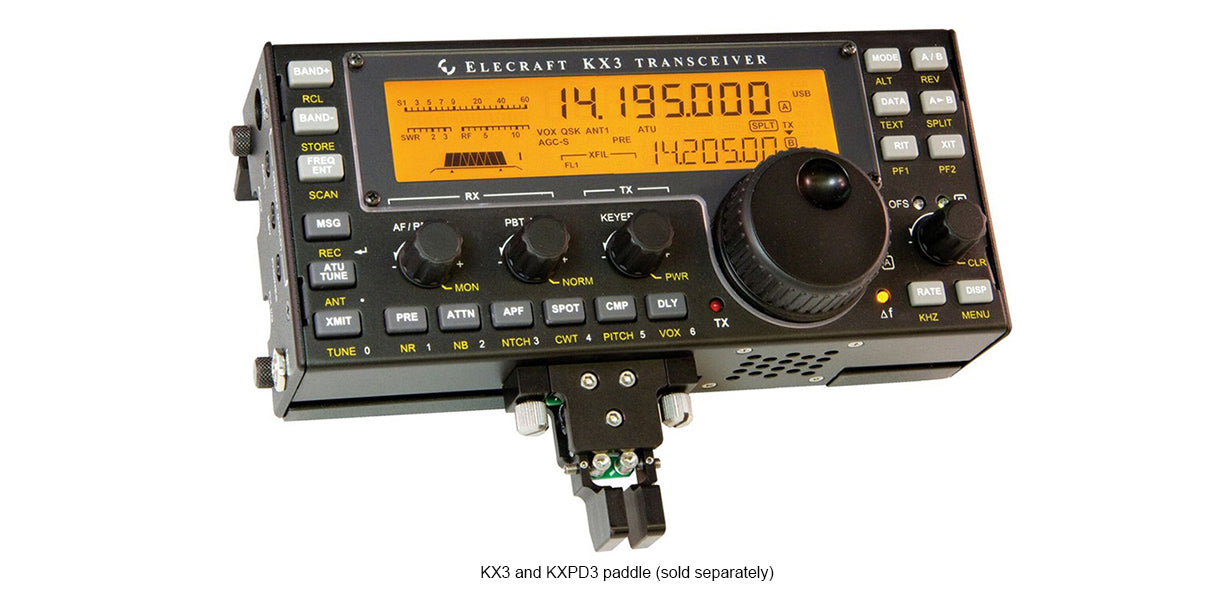
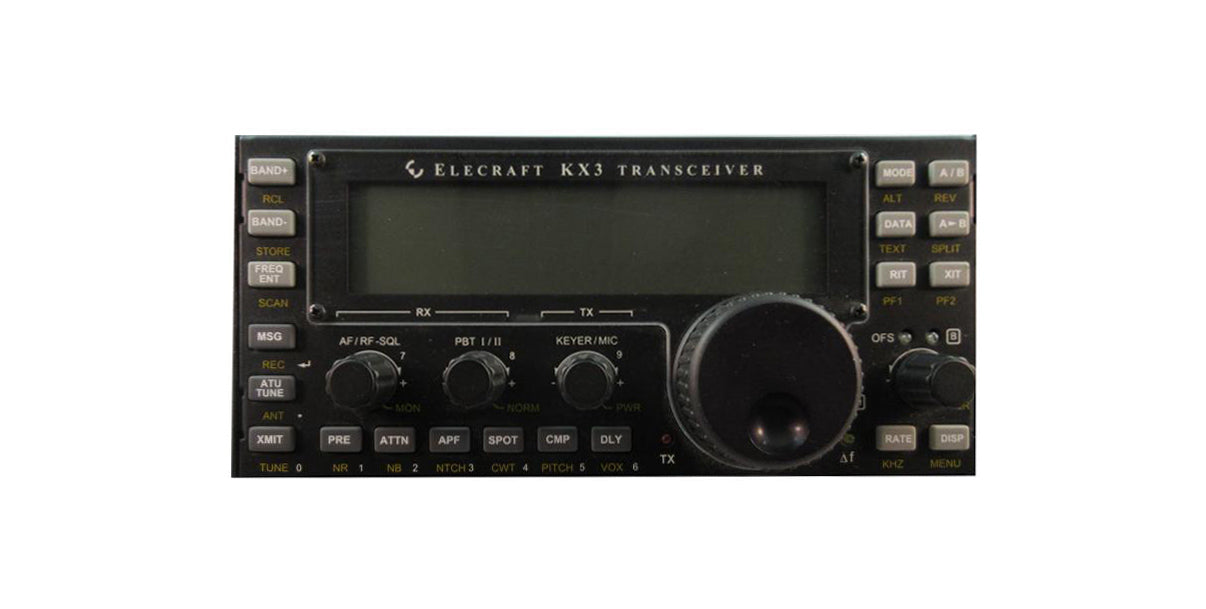
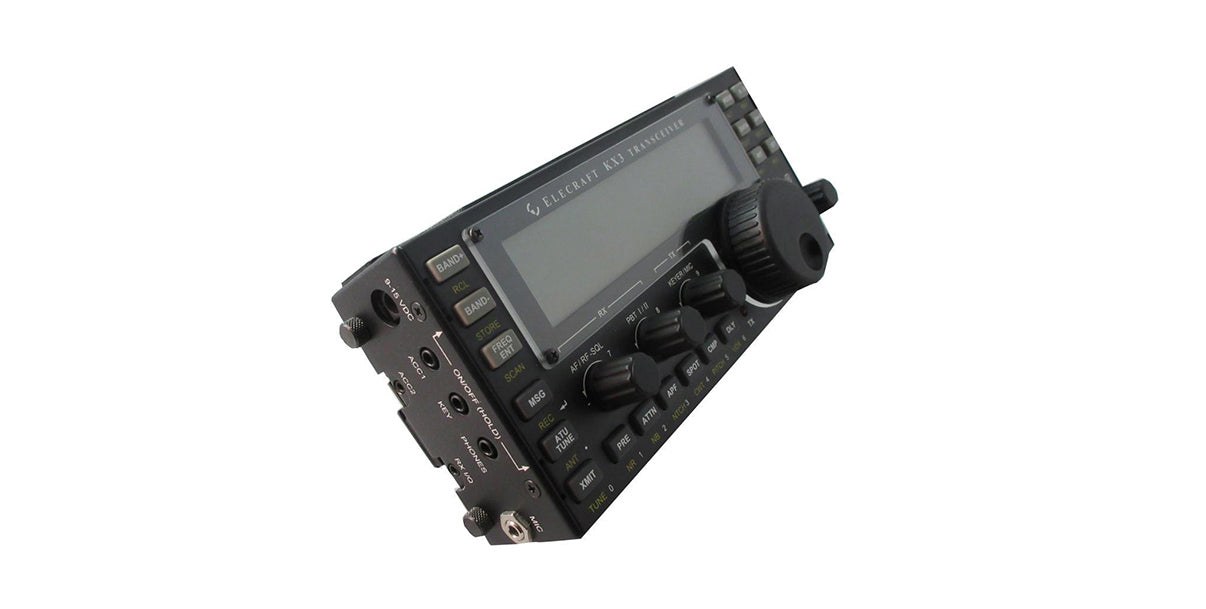
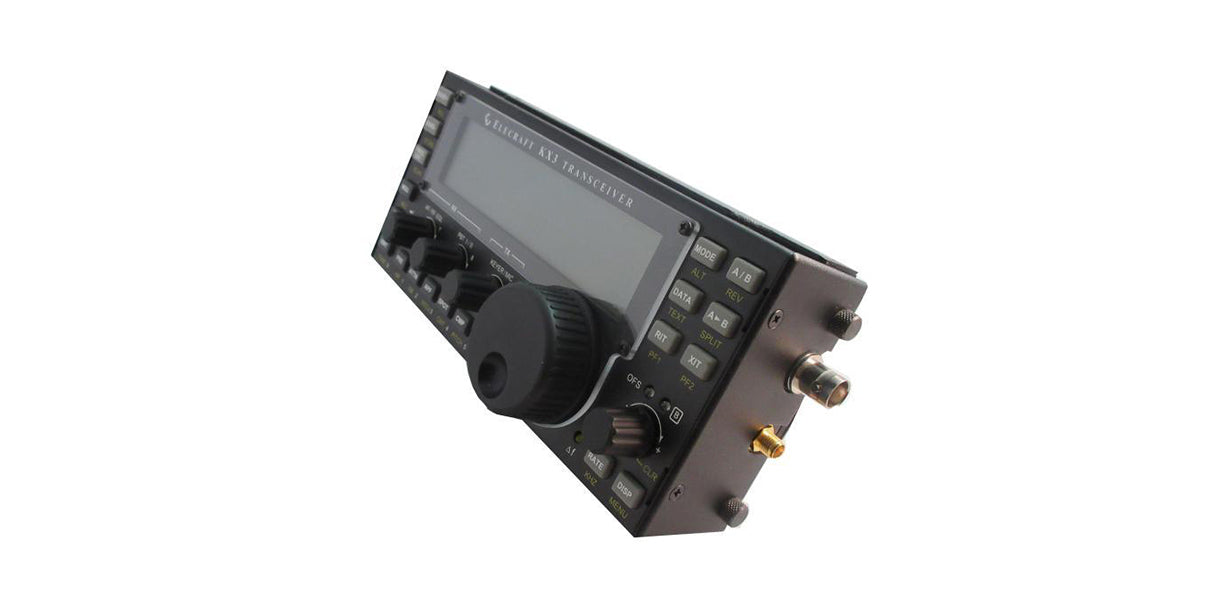
- Overview
- KX3 Packages
- Specs
- Options
- Reviews/Articles
- FAQ
- Manuals
- Price List/Order
OVERVIEW
The KX3's unique form-factor allows you to operate from anywhere. Fold out the rear tilt-feet for use on a desktop or picnic table. For extreme portability, you can add the internal wide-range ATU, 8-AA cell battery pack with NiMH charger, and adjustable KXPD3 keyer paddle. With a whip antenna, you can even operate hand-held.
In receive mode, current drain can be as low as 150 mA - about one-half to one-third that of competing all-band portables. Transmit efficiency is also excellent, further improving battery life.
Full-Featured, Yet Easy to Use
The KX3 features a large front panel with all controls optimized for convenient use. You won't have to dig through menus to set the power level, adjust the keyer speed, or change filter settings. And the KX3 has the same full-size display as the Elecraft K3S, so all operating information is available at a glance.
The KX3's tutorial-style manual explains how and why controls are used, so new Hams will be experts in no time. Of course, you'll also have Elecraft's legendary customer support and free firmware upgrades via the internet.
KX2 vs KX3: Which one should I buy? Learn More
KX3 Packages
Packages come factory assembled or as a kit.
KX3 PACK |
KX3 Shack-in-a-Pack |
|
KX3 160-6 M All Mode Transceiver |
KX3 160-6 M All Mode Transceiver |
| KXAT3 Internal 20-W Automatic Antenna Tuner | PX3 Panadapter for KX3 |
| KXBC3 Internal NiMH Charger / Real-Time Clock | KXFL3 KX3 Dual-Passband Roofing Filter |
| MH3 Hand Mic | KXAT3 20 Watt Internal Automatic Antenna Tuner |
| ES80 Carrying Case | KXBC3 Battery Charger |
| Package Savings! | BNC-RA Male-Female Right Angle |
| BNC-BP M-Binding Posts | |
| BNC-UHF Adapter | |
| KX3-PCKT Accessory Cable Kit | |
| MH3 Hand Mic | |
| ES80 Carrying Case | |
| The Elecraft KX-Line Book by Fred Cady | |
|
|
Package Savings! |
|
Our Power Supply Combo is the perfect Accessory for the Shack-in-a-Pack. |
KX3 PACK & SHACK options cannot be substituted for other options or accessories. AX1 in KX3 Shack-In-A-Pack photo is not included in the package.
SPECS
- Advanced DSP provides dual watch, noise reduction, noise blanking, auto-notch, stereo audio effects
- Software-defined radio (SDR) architectureplus optional roofing filters for excellent dynamic range
- Operates in data modes (PSK31/RTTY) with or without a PC; includes RX I/Q soundcard outputs
- Built-in speaker
- Internal options include wide-range ATU, battery charger, 2-meter module, dual-passband roofing filter
STANDARD FEATURES
- 160 - 6-meter ham bands; general coverage receive from 1.5 - 32.0 MHz (also covers 0.31 - 1.5 MHz with reduced sensitivity)
- All modes: SSB, CW, Data (four sub-modes), AM, FM
- Ultra-compact size: 3.4"H x 7.4"W x 1.7"D; 18 oz. (less options)
- Rear tilt feet fold up for transport
- Custom high-contrast LCD with alphanumeric text display
- Current drain as low as 150 mA in receive mode
- High-performance 32-bit floating-point DSP
- Built-in PSK/TTY decode/encode allows data mode operation without a PC; transmit in data modes using CW keyer paddle
- Low-noise synthesizer with 1-Hz tuning resolution
- Firmware updateable via provided application software
Receiver
- Quadrature down-sampling mixer compatible with PC-based SDR (software defined radio) applications
- Receiver I/Q outputs for use with PC soundcard
- Dual roofing filter option for enhanced dynamic range. (500/1500 Hz analog filters; effective IF b/w of 1000/3000 Hz)
- Switchable preamp and attenuator
- 8-band receive audio equalizer
- Dual watch over +/- 15 kHz range; uses applicable roofing filter
- Easy-to-use PassBand Tuning (PBT) for shift/width/hicut/locut; roofing filters automatically track DSP filter settings
- Automatic and manual notch filtering; adjustable noise reduction and noise blanking; binaural audio effects for enhanced receive
- Center-tuning indicator for CW and data modes
- Built-in speaker; stereo jack for headphones/external speakers
Transmitter
- Adjustable output, 0.1 to 10 W (8 W 12, 10 & 6 M)
- (100 W with KXPA100 amp)
- Rugged, SWR and temperature-protected final amplifier stage
- Optional MH3 microphone with PTT and UP/DOWN functions
- Optional attached keyer paddle with spacing adjustment
- Switchable PA output impedance for efficient 5-W or 10-W use
- Fast, silent, PIN-diode T-R switching - no relays
- DSP RF speech processing for excellent 'punch'
Other Features
- Built-in digital voice recorder (DVR) with two message buffers
- Internal CW keyer with 8-50 WPM range
- Six CW/DATA message memories
- 100 general-purpose memories store VFOs, modes, etc.
- Computer control via supplied USB cable or optional RS-232 cables
- Full remote-control command set works with most amateur radio software applications (emulates Elecraft K3)
- One-click firmware upgrades via the web (with free PC software)
Options
- KXFL3 Roofing Dual Bandwidth Filter for SSB/CW/DATA
- KXAT3 Internal, Wide-Range 20-W Automatic Antenna Tuner
- KXBC3 NiMH Charger
- KX3-2M Internal 2-Meter Module
ACCESSORIES
- KXPA100 100W External Amplifier (incl. DC power cable)
- MH3 Hand Microphone with UP/DN Controls
- Proset Boom Headset
- KXPD3 Attached Precision Keyer Paddle
- SS30DV Compact Switching Power Supply
- ES80 Carrying Case
KX3 BOOKS
REVIEWS/ARTICLES
- KX3 eHam Review
- Receiver Performance Comparison Table, Sherwood Engineering
- The SWling Post KX3 Review
- Backpacking with a Pocket-sized Shortwave Radio, Bruce Prior N7RR
FAQ
Q: Can the KX3-2M/4M module be installed along with other internal KX3 options, such as the ATU?
A: Yes. The module is about the size of a credit card and only about 1/8 (4 mm) thick. It fits on top of the KXAT3 ATU module, and does not displace any of the other internal options.
Q: What is the KX3-2M/4M module's power output?
A: RF power output is 2.5 W minimum (2.5 - 3 W typical) from an external 13.8 V supply, and 1 to 1.5 watts from internal batteries.
Q: What is the receive sensitivity (MDS)?
A: Typical MDS in either the 2-meter or 4-meter ham band is about -144 to -145 dBm.
Q: What frequency range will the module cover?
A: On 2 meters: About 120 to 165 MHz, allowing copy of weather-band stations at 162 MHz, airport tower AM in the 120 MHz range, etc. On 4 meters: About 65-72 MHz. Sensitivity gradually falls off outside the associated ham bands.
Q: Can I use the KX3-2M/4M module with FM repeaters?
A: Yes. The KX3 provides excellent repeater support, including programmable offsets, PL tones, REVerse, and up to 100 general-purpose labeled memories. Memories can be grouped for scanning and manual channel-hopping. For European transverters, the KX3 provides a 1750-Hz tone burst selection. This can be set up to generate an 0.5-second tone burst at the beginning of each transmission. The user can also hold the PITCH switch indefinitely in order to generate longer tone pulses, if necessary. Also see the SLEEP settings description in the next item (below).
Q: Does the module provide a DC signal at the antenna jack for external switching functions?
A: Yes. We're adding a menu entry to control this. When the signal is turned on, 5 volts (through a 4-kohm series resistor) is applied to the SMA jack. This can be used to control external devices such as a higher-band transverter, amplifier, or antenna switch.
Q: What is the current drain on 2 or 4 meters?
A: Total transceiver current drain is typically 300-350 mA on receive and 1.7 A on transmit at 3 watts, running from a 14 V supply. This is a bit higher than on the HF/6-m bands because we incorporated a high-dynamic-range, low-noise amplifier (LNA) in the front end.
There are also SLEEP settings that apply in FM mode (when the receiver is squelched) that can reduce average current drain by up to 50%, depending on the SLEEP time selected by the user.
Q: Is there any bandpass filtering to limit strong out of band signals from pagers and other fixed services outside the band?
A: Filtering is included at all stages of the receive path, including a 10-element band-pass filter ahead of the mixer. But because the module is so small, there's no room for a high-Q, tuned band-pass filter at the input; instead, we use low-loss low- and high-pass filters to preserve sensitivity. To reduce the need for narrow input filtering, we used a high-intercept LNA (low-noise amp). This increases current drain of the radio on 2 and 4 meters somewhat compared to other bands, but we felt it was an acceptable tradeoff.
Since the KX3-2M/4M module has its own antenna jack, you could use an external high-performance 144-148 or 70-71 MHz band-pass filter if required.
Q: What is the frequency stability?
A: Standard (uncompensated) frequency stability is sufficient for FM or AM operation. For CW/SSB/data use, it will be necessary to perform the KX3's extended VFO temperature compensation procedure, providing typical stability of about 10 Hz on 2 or 4 meters. This range is compatible with 170-Hz-shift RTTY but may not be compatible with some narrowband modes such as JT65 and WSPR.
Q: Can I use the KX3-2M/4M module as an I.F. for higher-band transverters?
A: Yes, in general, though it is important to distinguish between frequency-mixing transverters and frequency-multiplying transverters. If your high-band transverter uses a mixer (as most do), with the 2-/4-meter module's output used additively rather than with multiplication, then the total frequency stability will be a simple sum of the 2- or 4-meter module's and the transverter's. If however, the high-band transverter uses frequency multiplication of the 2- or 4-meter I.F., the total stability can be a multiple of what is described above, and it may or may not suffice for your application. (Frequency-multiplication transverters are pretty rare these days, and are typically limited to CW use only.)
Q: Does the KX3 support DTMF (dual-tone multifrequency signaling)?
A: Yes; the KX3's numeric keypad can be used to enter DTMF tones. After holding down PTT, tap "FREQ ENT" to enable DTMF entry, tap the desired digits (or hold for longer tones), then release PTT. All special DTMF characters are available on other KX3 switches: ATU TUNE (*), MSG (#), MODE (A), A/B (B), DATA (C), A>B (D).
Q: I sometimes hear a weak interfering signal from the KX3-2M on a nearby 2-meter receiver. Is this normal?
A: Some short-range emissions from the KX3-2M module maybe be unavoidable, depending on your station configuration. It may be possible to reduce specific emissions by relocating one antenna or adding filtering to power or control cables. (The KX3 uses lightweight sheet metal construction consistent with its primary function as ultraportable HF QRP rig, and it is not practical to provide 100% shielding at VHF.)





